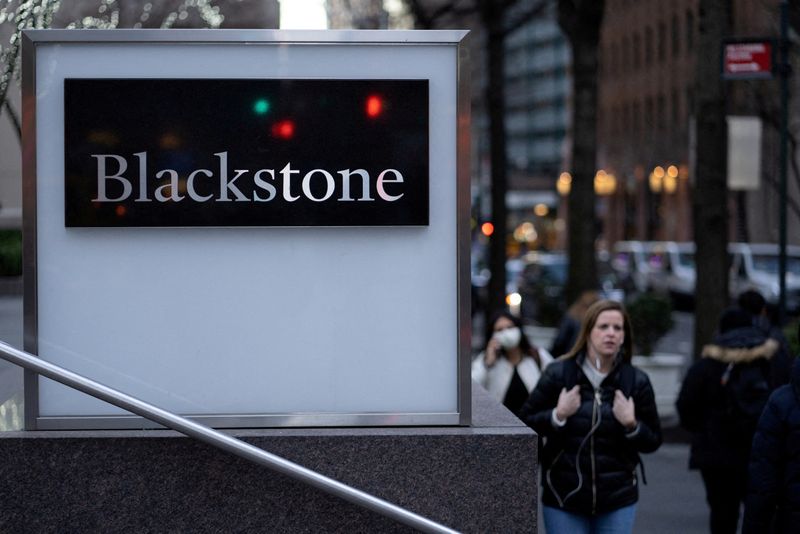By Chibuike Oguh and Anirban Sen
(Reuters) - Private equity firms that acquired companies since the banking crisis started on March 8 have funded the deals mostly with their own funds, a departure from traditional leveraged buyouts that reflects their struggle to secure cheap debt.
Four acquisitions of companies by private equity firms that were announced in the last two weeks were funded by debt that accounted for between 9% and 50% of the deal consideration, according to a Reuters review of regulatory filings. The remainder was equity checks by the private equity firms.
Typically, debt accounts for between 60% and 80% of the deal consideration, allowing the buyout firms to juice returns.
Private equity executives and their advisers say the shift towards more equity financing started before the turmoil in the banking sector this month, as the rise in interest rates over the course of the last year made debt more expensive, and fears about an economic slowdown made lenders more risk-averse.
Yet this trend picked up steam after three U.S. banks collapsed this month and concerns over the banking sector's resilience forced many lenders to retrench, they added.
"Private equity investors are having to pick their spots and need to have very strong conviction to be able to get a deal done," said Rob Pulford, partner and head of the financial and strategic investors group at Goldman Sachs Group Inc (NYSE:GS).
Graphic: US private equity-backed M&A declines https://www.reuters.com/graphics/GLOBAL-BANKS/BUYOUTS-DEBT/jnvwyjjzmvw/chart.png
When Blackstone Group (NYSE:BX) Inc clinched the $4.6 billion acquisition of U.S. cloud-based event-software provider Cvent Holding Corp from Vista Equity Partners on March 14, it only borrowed $1 billion for the deal. The rest came from Blackstone, the Abu Dhabi Investment Authority, and Vista, which rolled over a portion of its stake in Cvent.
In similar fashion, Silver Lake and the Canada Pension Plan Investment Board agreed on March 12 to buy data analytics firm Qualtrics International Inc for $12.5 billion by using only $1 billion in debt.
Apollo Global Management (NYSE:APO) Inc signed an $8.1 billion agreement to acquire specialty chemicals distributor Univar (NYSE:UNVR) Solutions Inc on March 14 by using debt for only half the deal consideration.
Symphony Technology Group agreed on March 13 to acquire Momentive Global Inc, the owner of online survey vendor SurveyMonkey, for $1.5 billion while using only $450 million in debt.
Six private equity firms polled by Reuters said they had not adjusted down their typical 20% annualized return expectations in light of the tough debt financing environment. They requested anonymity because such figures are kept confidential between the firms and their investors.
Bob Rivollier, a private equity partner at law firm Ropes & Gray, said that many buyout firms that rely heavily on equity financing believe it's possible to achieve the returns they have seen in the past by adding debt to the companies they buy down the road. This has made return assumptions on these deals more precarious, he added.
"Equity isn't cheap. Between a deal where 40 percent is equity and 60 percent is debt and one where 100 percent is equity, you're going to need a much higher return for the equity deal to get the same overall return to your investors," Rivollier said.
REFINANCING RISK
To be sure, a handful of private equity firms have already been accustomed to this kind of refinancing risk. Vista and Thoma Bravo are among the private equity firms that in the last 12 months have been buying companies with mostly equity financing with plans to add debt to them later. They do this to avoid lengthy negotiations with lenders while they hurry to clinch deals with sellers.
An upside to the shift toward equity financing, dealmakers say, is that the companies owned by the private equity firms have more cushion to absorb losses if their business deteriorates. Many of the leveraged buyouts that became bankruptcies in the wake of the 2008 financial crisis were the result of private equity firms saddling companies with debt to the hilt.

Jonathan Rouner, vice chairman of investment banking at Nomura Securities, said private equity firms reserved the option when to add more debt to their companies when it's possible and safe to do so.
"You fund the investment with equity and, when financing markets recover, do a large financing to take your equity back out," Rouner said.